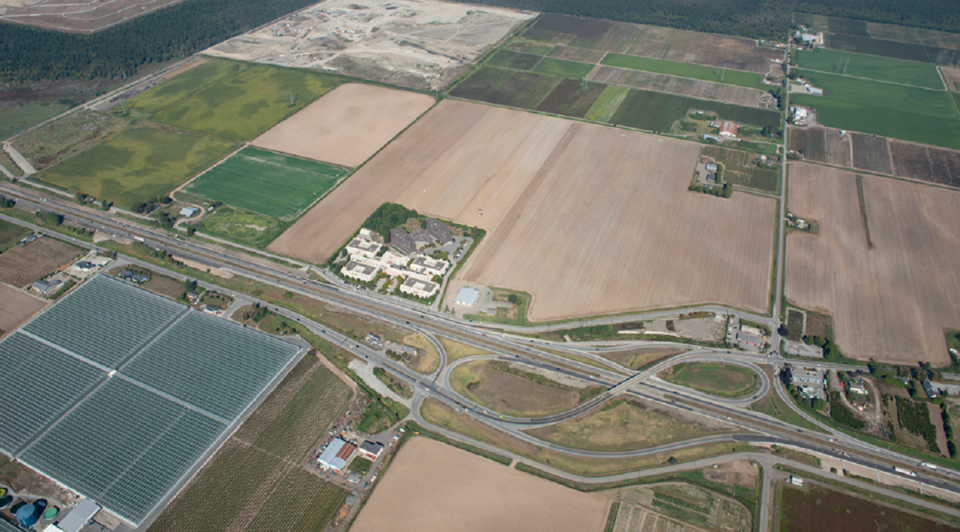Work continues the 78th Street Interchange Project in Delta which has a target completion date of winter of 2026.
It’s one of a series of road projects underway that are part of the Parkwood Industrial Estates development, located on 88th Street in East Ladner, a master-planned industrial business park.
The industrial project is being delivered by Parkwood 88th Street Property LP, a joint venture between Beedie and Pineland Peat Farms.
In 2018, the Beedie Development Group got involved by assuming ownership of the former Pineland Peat site.
Earlier that year, following a public hearing, Delta council granted approval in principle to the Pineland Peat Farms Ltd. application to develop the 66-hectare (163-acre) property into several heavy-industrial lots.
The new zoning permits a range of light and heavy industrial uses such as warehousing, wholesaling and distribution, as well as the sale, repair and rental of a range of products, cold storage, research laboratories, manufacturing and processing industries, fish processing and construction industries. Office operations and eating and drinking establishments are also be permitted.
Industrial land supply a growing concern
Meanwhile, the importance of having more industrial land has been highlighted in a report for Metro Vancouver, which the regional district recently shared with Delta council.
The Economic Impact of Industrial Lands study incorporates the most current data available, including employment counts from the 2021 Census and land uses from the 2020 Regional Industrial Lands Inventory.
“The latest findings reiterate that for Metro Vancouver, member jurisdictions, businesses, and stakeholders, industrial lands are the foundation for a significant amount of the region’s total economic activity, supporting a disproportionately large amount of employment and higher wages,” said Mike Hurley, Metro Vancouver Board Chair, in a letter to council.
Hurley notes the study found, among other things, that industrial land represents four per cent of the region’s land base and accommodates 22 per cent of the region’s jobs.
Through indirect and induced impacts, activity on industrial lands in Metro Vancouver contributes a total of 468,600 jobs to the region’s economy, 513,700 in B.C., and 584,100 in Canada, accounting for 30 per cent ($43 billion) of the region’s overall GDP and contributes $8 billion annually in government tax revenues.
A Delta staff response notes the report also suggests there is a sizable amount of non-industrial activity taking place on industrial lands, warning of potential effects of an insufficient supply of industrial land on the regional economy.
Other concerns include limited zoning for industrial lands, development barriers by governments, site connectivity restraints and complex or overlapping regulations.
The study also highlights that while half of Delta residents are higher income earners, they also travel some of the longest distances to their place of work.
Another proposed major industrial development still in limbo
Last summer, Mayor George Harvie during a meeting of Delta council expressed frustration that another major industrial development, which received preliminary council years earlier, was still waiting for the provincial government’s go-ahead.
Council agreed to put forward a request at the Union of BC Municipalities (UBCM) convention for a meeting with provincial ministers and officials to discuss the MKB Delta Lands development.
The proposed development west of Highway 91, near Nordel Way and the South Fraser Perimeter Road, includes 2.2 million square feet of industrial space.
Council granted conditional approval following a public hearing in the summer of 2016, but final approval was contingent on several conditions being met.
The project received Agricultural Land Commission approval in 2017. In 2019, Metro Vancouver’s board approved a land use designation change.
The city notes the project has been in limbo since its Water Sustainability Act application was submitted in August 2020.
“The MKB Delta Lands project represents a significant economic opportunity for the City of Delta and the broader Metro Vancouver region. However, the project has been severely hampered by delays in the permitting process under the Water Sustainability Act, threatening its viability and potential to contribute to local and regional economic growth. These delays are not isolated but reflect a broader issue affecting projects that require complex changes in and around streams, which are critical to their development and success,” according to the City of Delta.
The city called for immediate provincial intervention to address the permitting process delays.



